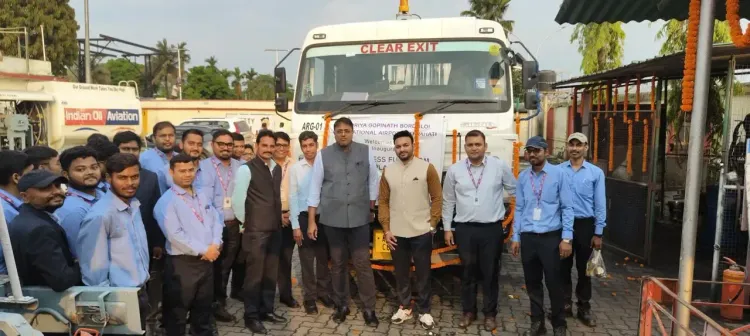What is the significance of the new open access fuel farm at Guwahati International Airport?

Synopsis
Key Takeaways
- Inauguration of an open access fuel farm at Guwahati International Airport.
- Boost in operational efficiency and sustainable aviation practices.
- Elimination of infrastructure duplication via a common fuel carrier.
- Enhanced competition and reduced costs for airlines.
- Future plans for a state-of-the-art jet fuel storage facility.
Guwahati, May 12 (NationPress) The Guwahati International Airport Limited, which oversees the operations of Lokpriya Gopinath Bordoloi International (LGBI) Airport, inaugurated an open access fuel farm and aircraft fueling facility on Monday. This initiative represents a crucial advancement in improving operational efficiency and fostering sustainable aviation practices at the airport.
A representative from LGBI Airport stated that the open access fuel farm and aircraft refueling facility were established by integrating assets from several oil marketing companies functioning at the airport.
Over the next 24 months, a jet fuel storage facility equipped with a cutting-edge hydrant refueling system is set to be launched at the airside.
This initiative at LGBI Airport aims to eliminate infrastructure duplication and equipment overlap by utilizing a common fuel carrier, thereby providing economies of scale through reduced infrastructure costs.
The open access model is expected to enhance competition, decrease costs, and lower the entry barriers for new market entrants, according to the official.
Furthermore, the hydrant system is designed to ensure a safe and efficient aircraft refueling process, streamlining fuel handling operations and paving the way for improved operational efficiency.
"The inauguration of the open access fuel farm and aircraft fueling facility at LGBI Airport marks a pivotal moment in the airport's evolution towards becoming a premier aviation hub," stated the spokesperson.
This development not only boosts the airport's operational capabilities but also emphasizes its dedication to sustainable and efficient aviation practices.
As the airport transforms, it symbolizes progress and innovation within the aviation sector.
The open access fuel farm is a distinctive fueling mechanism at airports that creates an equitable playing field for oil marketing companies (OMC), enabling them to supply fuel to airlines according to their contracts.
This arrangement optimizes the jet fuel handling supply chain.
It eliminates barriers for new oil marketers and expands choices for airlines in selecting their preferred OMC for refueling.
The Guwahati International Airport Limited (GIAL) is operated by Adani Airport Holdings Limited (AAHL), which is a subsidiary of Adani Enterprises, the flagship company of the globally diversified Adani Group.
The GIAL is part of a Public-Private Partnership (PPP) with Airport Authority of India (AAI), established under a 50-year concession agreement.
AAHL aims to connect India's major cities through a hub-and-spoke model, utilizing the Group's expertise in developing and managing complex transport and logistics hubs.
Located in Borjhar, approximately 26 km from Guwahati, Assam's primary city and commercial center, the LGBI Airport serves as the main international airport in northeast India.
Named after Assam's first Chief Minister, Gopinath Bordoloi, this airport is a vital gateway to the northeastern states, linking the region with key domestic and international locations.
The Guwahati Airport features diverse services, including retail shops, dining options, lounges, and business facilities, ensuring a pleasant experience for travelers.









